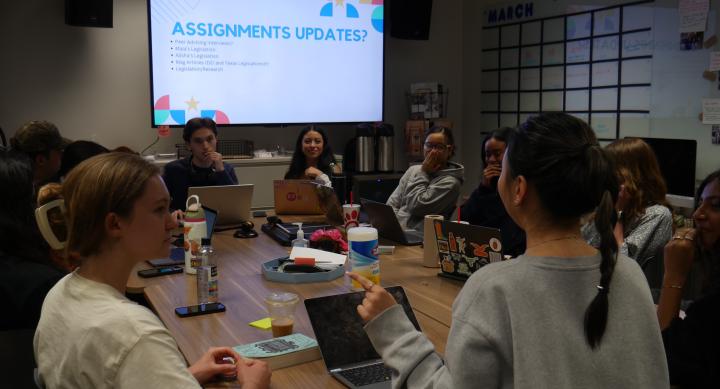
Photo by Diyaa Dossani
What do you know about the Senate of College Councils? If your mind went blank, no worries. Until writing this story, I was right there with you.
I joined Communication Council last September. Writing for this very magazine has immersed me in all aspects of communication, but I realized that even I did not understand the “council” aspect of our name. So, I set out to learn more about how our council contributes to the broader Senate of College Councils, also referred to as Senate. To do so, I attended general assembly meetings and spoke with Senate President Samanvi Velagapudi and Vice President Aashi Vishnoi.
I left in awe of what I had been missing right in front of me. The Senate of College Councils is not just an organization but a tool for school-wide academic change. It is time to utilize it.
Though often confused, the Senate of College Councils and UT Student Government are separate governing bodies. While Student Government focuses on student life, Senate’s work is related to academic advocacy, accessibility and resources. One example of this work is the creation of Academic Exploration Week.
“Students interested in adding or transferring majors get paired with mentors that are upperclassmen from that major,” Velagapudi explained.
Academic projects like this are based on Senate’s three main pillars — legislation, advocacy and scholarship. Senate is made up 18 councils representing different colleges, schools and units across UT. In addition to the councils, Senate’s internal body comprises an executive board and seven committees led by Senate’s leadership team. The internal body and president, vice president and financial director of each council convene at biweekly general assemblies on Thursday nights.
“We talk about different topics and vote on legislation,” Vishnoi said. “Think big picture and higher level. What is the state of academics at our university?”
Each general assembly meeting includes a general update from the executive board, updates from each council, a legislative section and potentially a guest speaker from another organization. Proposing or supporting legislation is the main focus of each meeting, and it is a way to show collective student support on certain issues.
“We are OK waiting for long-term change, but we just want to make sure that written support is out there,” Velagapudi said.
To get a bill started, a member of Senate must introduce it at a general assembly, providing the context, research and intentions behind the resolution. If there is no opposition within Senate, council representatives take it back to their constituents for voting. If this passes in a majority vote among councils, the bill returns to Senate for a final vote. If passed, it is presented to stakeholders as a show of student support.
“It could be a way to push things over the line with administration,” Vishnoi said. “It could be the starting point of a conversation, or it could just show unified support over time.”
One example of this unified support can be seen in the continued effort to get free student access to Adobe. Proposed by the Fine Arts Council and continued with other councils as collaborators, this project, Vishnoi said, is a testament to students’ perseverance.
“It’s been very slow progress, but I think that slowness shouldn’t discourage people,” Velagapudi said.
This inspiration is present through all of Senate’s bodies, and the energy is more than contagious. I witnessed this as our very own Comm Council advocated for free student access to Canva, a graphic design program. When our policy chair, Ethan Thompson, presented the resolution at the general assembly alongside his supporters, the collective affirmation was outstanding. During the subsequent voting within Comm Council, the wide smiles of the policy committee paired with the eruptive cheers of the entire council were a testament to the power of the college councils.
Moody students should capitalize on this unique power. And you don’t have to be in Comm Council to do so.
While involvement in a Senate body requires being a member of one’s college council, being an active participant in legislation does not. Comm Council’s policy committee works as a facilitator between students and concrete, university-wide change by drafting legislation and bringing it to Senate. However, it is student voices, concerns and ideas that inspire these resolutions. To garner student opinion, Comm Council’s Student Issues and Advisory Committee (SIAC) connects directly with students and takes feedback.
So, whether it is talking to a “commie” in the hallway, grabbing a cookie at SIAC’s “Cookies for Comments,” or even applying to Comm Council, each Moody student has the power to create change large and small. Let’s get to it!
